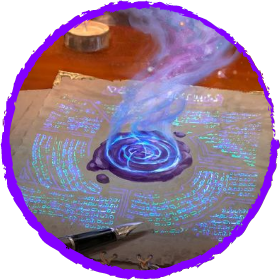Theorem: Difference between revisions
No edit summary |
Vicissitude (talk | contribs) No edit summary |
||
| (11 intermediate revisions by 2 users not shown) | |||
| Line 1: | Line 1: | ||
[[Category:Arcana]] | [[Category:Arcana]] | ||
[[Category:Theorem]] | |||
[[Category:Created by Aster]] | [[Category:Created by Aster]] | ||
<div style="text-align:center; background-color: #f8f8f8; padding: 0px 20px 0px 20px; margin: | <div style="text-align:center; background-color: #f8f8f8; padding: 0px 20px 0px 20px; margin: 0px;"> | ||
[[File:TheoremBanner.png|center]] | |||
'''Theorems''' are an approximation of supernatural knowledge, arming the mundane with the ability to understand and act against supernatural forces. Those who practice Arcana with no theory struggle to control their power or that of others. '''Theorems do not require a Minor Merit to pursue.''' | '''Theorems''' are an approximation of supernatural knowledge, arming the mundane with the ability to understand and act against supernatural forces. Those who practice Arcana with no theory struggle to control their power or that of others. '''Theorems do not require a Minor Merit to pursue.''' | ||
<table style="width:80%;margin-left:10%;margin-right:10%;text-align:left;"> | <table style="width:80%;margin-left:10%;margin-right:10%;text-align:left;"> | ||
<tr> | <tr> | ||
<td> | <td> | ||
<div style="text-align:center;"> | |||
=Theorem= | |||
__TOC__ | |||
<div style="text-align:left;"> | |||
==History== | ==History== | ||
The acknowledgment of Arcana as a | The acknowledgment of Arcana as a formalized series of schools began in the 1298th year of the Second Era, when the Deepholds proposed that the sprawling and bloated study of [[Arcana]] be separated into Theorems dictating its various classifications. | ||
[[ | :[[Ensorcelling]] - the formal study of dominating [[Alkahest]], [[Galdr]], and [[Practice|Practices]] - was born from no less than fifty years of bureaucracy. Twenty years later, [[Mysticism|Mystics]] took shape to study the myriad of [[Welkin]]. The ancient tradition of [[Animism]] was soon integrated six years later, encompassing now an academic approach to the study of [[Glamour|Fae Glamour]] and the so-called '[[Gramarye|Wild Glamour]]' of beasts and tradition. | ||
By the present [[history|era]], scholars from all planes including Antarok, Céleste, and Ælphyne have since adopted the concept of Theorems, and | :By the present [[history|era]], scholars from all planes including Antarok, Céleste, and Ælphyne have since adopted the concept of Theorems, and academic institutions - even the mundane - have done all they can to formulate courses for these fields of study. | ||
</td> | </td> | ||
</tr> | </tr> | ||
| Line 19: | Line 24: | ||
==Purpose== | ==Purpose== | ||
'''Theorems''' govern not just the study of Arcana, but also its principled usage. The more is known about a Theorem, the more apt a mage is at wielding associated Arcana safely. Magi who lack theory know little about their own spells, and they struggle to respond against the spells of others or even their own mistakes. Such 'hedge magic' spells are slow, prone to fizzling or even backlash - yet some argue those who refuted Theorems have on occasion joined the ranks of the [[Ascended]]; these detractors fail to mention the [[Apotheotic]] commonly referenced - Nunis Daar - was missing chunks of his brain by his own error and could no longer operate the muscles in his face. | '''Theorems''' govern not just the study of Arcana, but also its principled usage. The more is known about a Theorem, the more apt a mage is at wielding associated Arcana safely. Magi who lack theory know little about their own spells, and they struggle to respond against the spells of others or even their own mistakes. Such 'hedge magic' spells are slow, prone to fizzling or even backlash - yet some argue those who refuted Theorems have on occasion joined the ranks of the [[Ascension|Ascended]]; these detractors fail to mention the Ascended [[Galdr|Apotheotic]] commonly referenced - Nunis Daar - was missing chunks of his brain by his own error and could no longer operate the muscles in his face. | ||
===Esotera=== | ===Esotera=== | ||
To broaden one's understanding of Arcana, they must seek ''Esotera''. This is done through any number of methods, from studying beneath a mentor and collecting books or journals, to dangerous magical duels and wild experiments, or traveling the Planes and engaging in cultural exchange with any mages not hostile to foreigners. In time a student will begin to understand the function and possibilities behind not just their own magic, but that of | To broaden one's understanding of Arcana, they must seek ''Esotera''. This is done through any number of methods, from studying beneath a mentor and collecting books or journals, to dangerous magical duels and wild experiments, or traveling the Planes and engaging in cultural exchange with any mages not hostile to foreigners. In time a student will begin to understand the function and possibilities behind not just their own magic, but that of others. | ||
:There is little in the way of anti-magic, and no armor nor ward is fool-proof. A battle between two mages is swift and brutal; two opposing forces cancel each other out, or they destroy the weaker. Esotera will help a mage to select the right action, to understand and undo an opposing force before it begins to harm them irreversibly. | :There is little in the way of anti-magic, and no armor nor ward is fool-proof. A battle between two mages is swift and brutal; two opposing forces cancel each other out, or they destroy the weaker. Esotera will help a mage to select the right action, to understand and undo an opposing force before it begins to harm them irreversibly. | ||
</td> | </td> | ||
</tr> | </tr> | ||
</table> | </table> | ||
= | |||
==Theorems== | |||
<table style="width:80%;margin-left:10%;margin-right:10%;text-align:left;"> | <table style="width:80%;margin-left:10%;margin-right:10%;text-align:left;"> | ||
<tr> | <tr> | ||
<td style="width: | <td style="width:100px;"> | ||
[[File: | [[File:Theorem.png|100px|Theorem.]] | ||
</td> | </td> | ||
<td> | <td> | ||
[[ | [[Theorem|Theorems]] are a form of supernatural study, arming the mundane and magi alike with the ability to understand or act against supernatural forces. Theorems '''do not''' need a [[Merit|Minor Merit]] to unlock. See [[Theorem]].<hr> | ||
</td> | </td> | ||
</tr> | </tr> | ||
</table> | |||
<table style="width:80%;margin-left:10%;margin-right:10%;text-align:left;"> | |||
<tr> | <tr> | ||
<td style="width:60px;"> | <td style="width:60px;"> | ||
[[File: | [[File:Lore.png|50px|Animism.]] | ||
</td> | </td> | ||
<td> | <td> | ||
[[ | [[Animism|Animists]] study [[Saol|life force]] and nature, forming ''bonds'' with plants and beasts, big and small. [[Glamour]] and its [[Gramarye|wild derivatives]] of Saolbinding, Florabinding and Beast Magic each fall within the purview of an Animist. See [[Animism]].<hr> | ||
</td> | </td> | ||
</tr> | </tr> | ||
| Line 52: | Line 58: | ||
</td> | </td> | ||
<td> | <td> | ||
[[ | [[Mysticism|Mystics]] are purveyors of [[Metaphor]] who come to understand [[Welkin]], the [[Planes]] and their [[Religion|Godheads]], and the [[Undead]]. They use their soul as a tool for gathering information from the world around them, creating tools to harm the incorporeal while burning [[Alkahest]] to summon [[Spirit|Spirits]] as loyal guardians. See [[Mysticism]].<hr> | ||
</td> | </td> | ||
</tr> | </tr> | ||
<tr> | <tr> | ||
<td style="width:60px;"> | <td style="width:60px;"> | ||
[[File: | [[File:Arcanology.png|50px|Occultism.]] | ||
</td> | </td> | ||
<td> | <td> | ||
[[ | [[Ensorcelling|Ensorcellers]] study [[Galdr]], [[Aether]], the domination of [[Metaphor]], and most [[Practice|Practices]] in order to conjure miracles from [[Alkahest]]. Extraordinarily versatile, Ensorcelling is a [[Arcana|mage's]] best friend. See [[Ensorcelling]].<hr> | ||
</td> | </td> | ||
</tr> | </tr> | ||
</table> | </table> | ||
Latest revision as of 20:11, 31 August 2024
Theorems are an approximation of supernatural knowledge, arming the mundane with the ability to understand and act against supernatural forces. Those who practice Arcana with no theory struggle to control their power or that of others. Theorems do not require a Minor Merit to pursue.
TheoremHistoryThe acknowledgment of Arcana as a formalized series of schools began in the 1298th year of the Second Era, when the Deepholds proposed that the sprawling and bloated study of Arcana be separated into Theorems dictating its various classifications.
|
PurposeTheorems govern not just the study of Arcana, but also its principled usage. The more is known about a Theorem, the more apt a mage is at wielding associated Arcana safely. Magi who lack theory know little about their own spells, and they struggle to respond against the spells of others or even their own mistakes. Such 'hedge magic' spells are slow, prone to fizzling or even backlash - yet some argue those who refuted Theorems have on occasion joined the ranks of the Ascended; these detractors fail to mention the Ascended Apotheotic commonly referenced - Nunis Daar - was missing chunks of his brain by his own error and could no longer operate the muscles in his face. EsoteraTo broaden one's understanding of Arcana, they must seek Esotera. This is done through any number of methods, from studying beneath a mentor and collecting books or journals, to dangerous magical duels and wild experiments, or traveling the Planes and engaging in cultural exchange with any mages not hostile to foreigners. In time a student will begin to understand the function and possibilities behind not just their own magic, but that of others.
|
Theorems
|
Theorems are a form of supernatural study, arming the mundane and magi alike with the ability to understand or act against supernatural forces. Theorems do not need a Minor Merit to unlock. See Theorem. |
|
Animists study life force and nature, forming bonds with plants and beasts, big and small. Glamour and its wild derivatives of Saolbinding, Florabinding and Beast Magic each fall within the purview of an Animist. See Animism. |
|
|
Mystics are purveyors of Metaphor who come to understand Welkin, the Planes and their Godheads, and the Undead. They use their soul as a tool for gathering information from the world around them, creating tools to harm the incorporeal while burning Alkahest to summon Spirits as loyal guardians. See Mysticism. |
|
|
Ensorcellers study Galdr, Aether, the domination of Metaphor, and most Practices in order to conjure miracles from Alkahest. Extraordinarily versatile, Ensorcelling is a mage's best friend. See Ensorcelling. |




